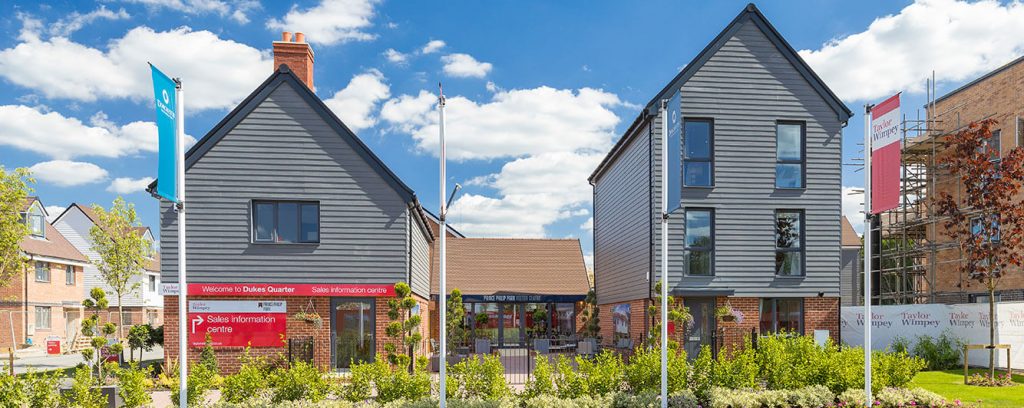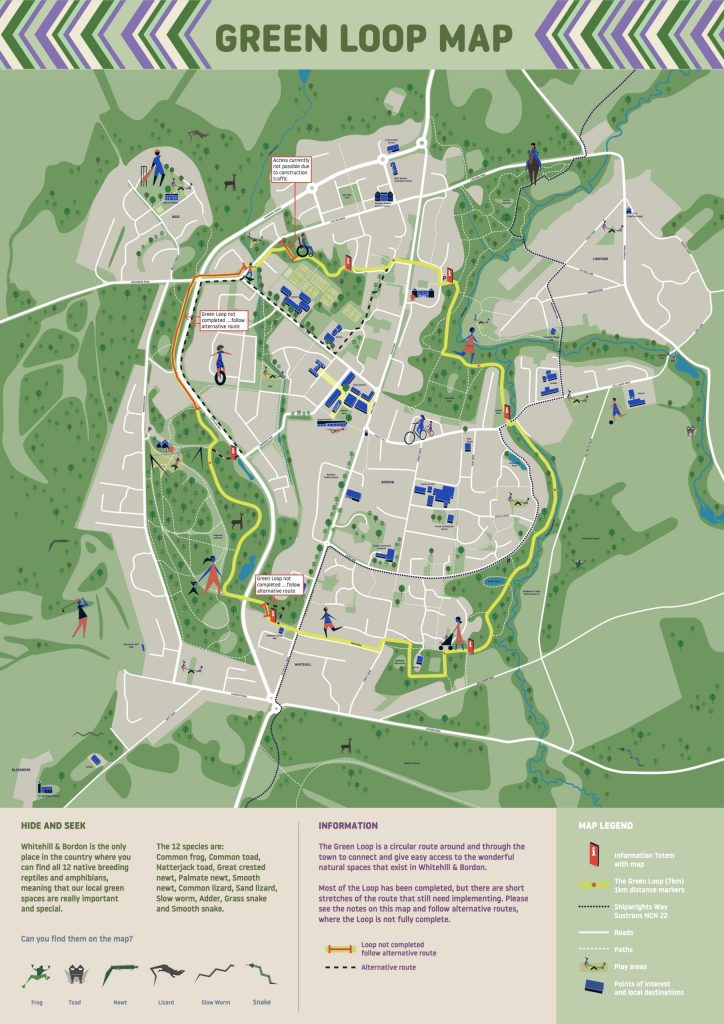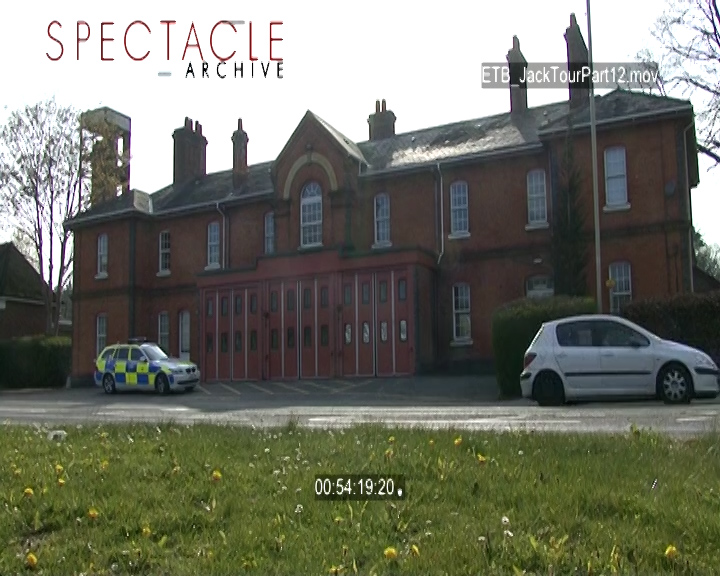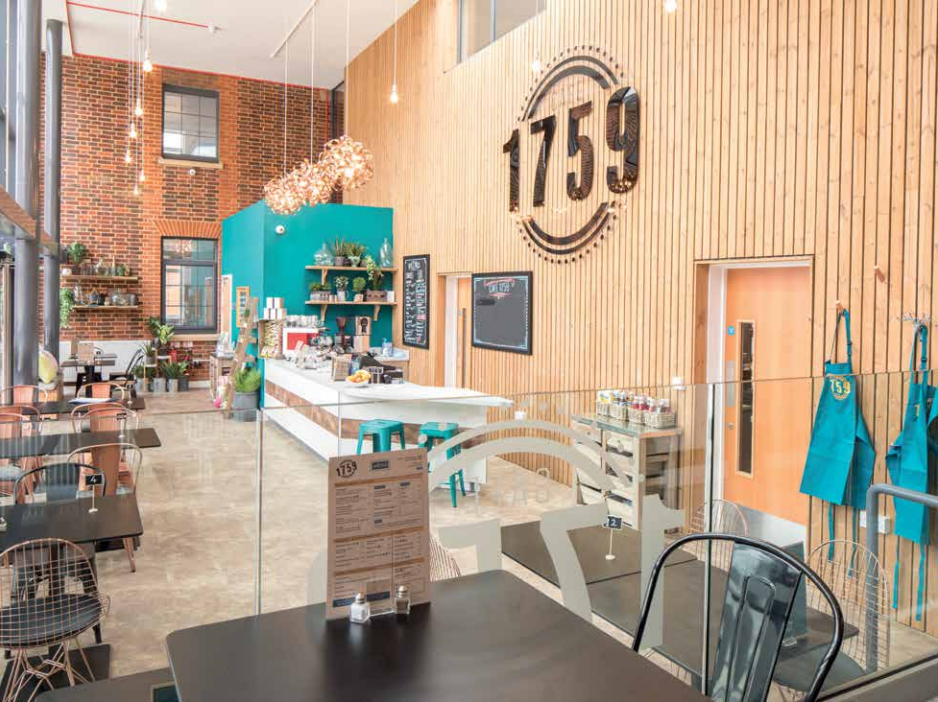
Ordinance Survey map of Current Whitehill and Bordon regeneration plans
12 years ago, Spectacle investigated the former military towns of Bordon and Whitehill in Hampshire, which were part of a plan by the UK Government’s Homes and Communities Agency (HCA), to turn these two neighbouring towns into an ‘Eco-Town’. An effort to create a self-sustaining, eco-friendly town to combat the threat of climate change. The HCA no longer exists and funding for the project was cut in half in 2010. There have been new developments over the past decade such as Prince Phillip Park, the Green Loop, and Quebec Park, previously the Quebec Barracks. Are these developments true to their original Eco-Town goals, or as some say, greenwashing? Are the new homes truly affordable housing for local residents? An expensive lost opportunity?
The UK eco-town plans originally set up in 2007 had taken inspiration from the European eco cities of Amersfoort, the Netherlands, Freiburg, Germany, Hammarby, Sjöstad, Sweden, Zaragoza, Spain and also Dongtan in China. The UK set up its own guidelines based on these case studies;
- Eco-towns must be new distinct settlements, separated but well linked to surrounding towns
- Consist of at least 5,000 new homes, 30%-50% of which need to be affordable housing and the town overall reaching zero carbon standards.
- They must also contain a variety of facilities including a secondary school, a retail centre, business and leisure spaces to provide local employment and entertainment
- Become the lead example for at least one area of environmental sustainability and a new management body should be set up to help the development of the town.
- It must be easy for residents to default to a more sustainable lifestyle, including reducing the use of cars in favour of cycling or walking.
- For the developers, there must be a focus on conserving energy for new construction projects that need to be energy and resource efficient and be powered by renewable energy.
In 2008 there was a shortlist of 15 planned sites across the UK for eco-town development, by 2010 there were 4 successful bids, including the garrison town of Bordon. In the May 2010 general election, Labour lost to a Conservative and Lib Dem coalition. This resulted in the funding for the eco-towns, planned by the previous government, to be cut in half. The standards for the eco-town developments were also lowered, with only Northwest Bicester in Oxfordshire still being developed closely to the original guidelines. The other 3 only needing, by law, to cover the standard building requirements of any new suburban housing model. All original eco-town development plans nationwide were archived and shelved in 2012.

Plans to regenerate Bordon into an eco-town continued, leading to various construction plans, some of which are still being built. The largest construction project is Prince Phillip Park which intends to build over 2,400 new sustainable homes on the north west of the town, beside the upper half of Hogmoor inclosure. The current residents of Bordon are not generally approving of the plans, with the Park’s Facebook page currently only having 2.5 stars out of 5. Some of the main complaints being the loss of woodland for the area, the unaffordability to buy or rent one of the new homes, and what are considered to be poorly thought out designs.
The eco-friendly marketing of the Park by the The Whitehill & Bordon Regeneration Company, a joint venture between Dorchester Regeneration and Taylor Wimpey UK, could be accused of ‘greenwashing’, or overstating the environmental sustainability of the developments. For instance, the advertised ‘Green Spaces’ in the park are not new, but forested areas that were already there and that are now enclosed in the Park’s vicinity. They claim they are going to build new green spaces, however it would appear from the Prince Phillip Park timeline there have still not been any new green spaces created. Many residents are unhappy and feel their wishes for the regeneration of existing built areas, such as Bordon High Street, have been ignored.

Another plan for sustainability in Bordon and Whitehill is ‘The Green Loop”. This is a walkable and bikeable trail encompassing the towns to encourage residents to travel around the area on foot and to stop using their cars. On the surface it does comply with the original eco-town goal of having residents reduce the use of their cars. This plan has been praised and awarded more for its potential than its practical pay-off. Winning the ‘Best Project’ and ‘Best in Region’ awards by the Royal Town Planning Institute (RTPI) for its incorporation of an app called BetterPoints which would reward users of the loop for their activity and the Whitehill Town Council’s plan to collect drone footage of the users to see their activity day-to-day. The idea of the Green Loop is a sustainable one if it becomes a success with the residents of Bordon and Whitehill, but it requires their action for it to work, relying on them for the reduction of emissions from the town, rather than actually implementing forms of green public transport.
Much like Prince Phillip Park, the Green Loop also does not include any newly created green spaces, relying on spaces that are already there, so does not actually make the town any greener. As for how useful it is to the residents, most work outside of Bordon and have to commute away from the town anyway, which is not helped by the fact that there are very few plans to renovate old areas of the town which could otherwise provide local employment. For example, the old fire station was converted into an ‘ecostation’ in 2012, but has not seen much use since the change.

Not all changes to the town have been met with hostility however. The Quebec Barracks, formerly owned by the Ministry of Defense, was sold in 2013 to the government’s Homes and Communities Agency. This agency no longer exists as it was split into Homes England and the Regulator of Social Housing. The Quebec Barracks development is listed Under Schemes Confirmed by Homes England. It cites as both the lead partner and developing organization as Swaythling Housing Society Limited, who in turn manage the subsidiaries for the company Abri, named as the developers of Quebec Park on their website.

Abri is a non-profit organization regulated by the Financial Conduct Authority. In Quebec Park they have built 65 for-sale homes, 10 shared ownership and 25 affordable rent houses. Two former Barracks buildings were also converted into an employment centre and ‘Café 1759’. Already this new housing site avoids many of the issues faced by Prince Phillip Park, provides affordable housing, encourages local employment and the café is proving to be popular with residents as it has a 4.5 out of 5 on google and a 4.8 out of 5 on Facebook. It is also sustainable for the local environment, being solely built on a brownfield site and the housing itself designed to be environmentally friendly, with construction planned as to be ‘fabric first’ and the houses are also Low Carbon Homes.
Eco-towns are a controversial subject, not only within Bordon but in other areas given the go-ahead for development. The Rackheath eco-town in Norwich has seen similar opposition from the local population in the form of the Stop Norwich UrBanisation organisation (SNUB). Spectacle interviewed SNUB member Stephen Heard in 2010. Creating a zero-carbon emission settlement appears to be much more of a troubling endeavour and requires careful in-depth planning as well as close consultation with the residents affected by the change. As more pressure builds on the government to make serious, nationwide action on climate change, should there be another attempt for sustainable development to UK towns and how strict should the guidelines for development be? How could we stop false promises and greenwashing from occurring in these plans? And how could we ensure their success?
Click Eco Towns and Villages for more blogs
See our Eco Towns and Villages project pages for more information and videos.
archive@spectacle.co.uk
Spectacle homepage
Like Spectacle Documentaries on Facebook
Follow SpectacleMedia on Twitter
